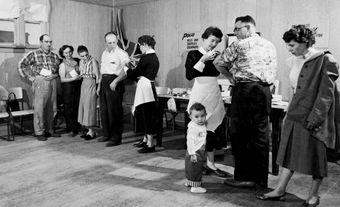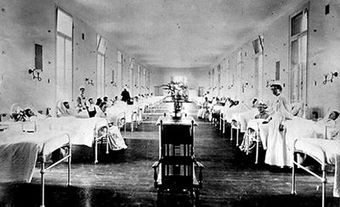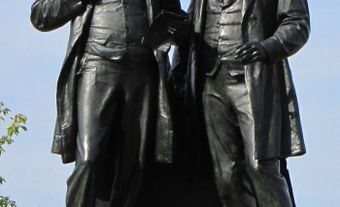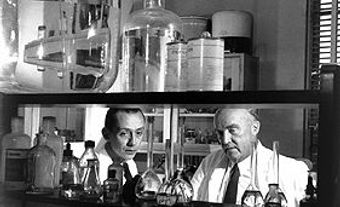James Miranda Steuart Barry, FRS (probably born Margaret Anne Bulkley), military surgeon, physician (born c. 1789–99; died 25 July 1865 in London, England). Posted across the British Empire, Barry reformed medical standards in the British army. His final and highest-ranking position was as inspector-general of military hospitals in the Province of Canada in the 1850s. After his death, it was reported that Barry’s assigned sex at birth was female. This has sparked significant debate about his identity.
Note on pronouns: This article refers to James Barry with masculine pronouns, as this was how Barry referred to himself throughout his life.
Click here for definitions of key terms used in this article.
Early Life and Education
James Barry first appears on record in 1809. This was shortly before he enrolled at the University of Edinburgh (Scotland) to study medicine. It is widely believed that Barry was born Margaret Anne Bulkley, to Mary Anne and Jeremiah Bulkley of Cork, Ireland around 1789. Margaret Bulkley disappears from record shortly before James Barry appears. Additionally, handwriting analysis of their letters suggests a match.
Barry’s vague and sometimes conflicting statements about his childhood have also raised questions about his identity at birth. He made inconsistent references to his birthdate, for example.
When Barry began his studies at the University of Edinburgh, only men were admitted. Many believe this is why Barry took on a male identity. Barry graduated with a Doctor of Medicine in 1812, submitting a final thesis on femoral hernias (a less common type of hernia that occurs most often in older women). He then returned to London and took more courses in surgery and anatomy. These were relatively new fields at the time. Barry was admitted to the Royal College of Surgeons in London in early 1813.
Other evidence historians have cited to link Bulkley to Barry
–A Royal Academy artist named James Barry was probably Margaret’s uncle. He introduced his young relative to Venezuelan revolutionary General Francisco de Miranda and David Steuart Erskine, Lord Buchan. These connections gave the aspiring doctor credibility. They also appear to have inspired his names. James Barry the artist died in 1806 and his money made it possible for James Miranda Steuart Barry to pay for university.
–Mary Anne Bulkley accompanied Barry while in Edinburgh, supposedly as his aunt. Barry once introduced her as his mother, however.
–In a letter to General de Miranda, Barry asks him not to mention Margaret Bulkley: “As Lord B— nor anyone here knows anything about Mrs Bulkley’s Daughter, I trust my dear General that neither you nor the Doctor will mention in any of your correspondence anything bout my Cousin’s friendship and care for me.”
–In a letter, Margaret Bulkley once expressed her desire to serve in the army, as Barry would do: “Was I not a girl I would be a soldier!”
Army Medical Career
James Barry passed the Army Medical Board oral exam in July 1813. He began his army career as an assistant in military hospitals in Chelsea and Plymouth, England. After two years, he received his first overseas posting to the Cape Colony (now South Africa). This began a long, distinguished and at times stormy career across the British Empire. Wherever he was posted, Barry fought to improve hygiene, sanitation and medical standards ( see also Public Health).
Barry arrived in Cape Town in 1816. Over the course of 12 years, he worked his way from assistant surgeon to colonial medical inspector, physician to the governor’s household and inspector for many public institutions. He bettered the treatment of prisoners, people with leprosy and patients in asylums. He also tightened regulations for giving drugs to patients. His push for reform, short temper and vocal discontent with red tape often landed him in trouble. He was demoted, arrested and even fought a duel with an army captain.
Did you know?
In South Africa, Barry successfully performed one of the first recorded Caesarean sections where both the mother and child survived.
After Cape Town, Barry took up postings in Mauritius and then Jamaica. In Jamaica, his reforms led to a drop in the number of deaths in military camps. He saw his first front-line military action during the Great Slave Revolt in Jamaica in 1831–32.
His next posting was as principal medical officer (PMO) in St. Helena. He was arrested twice during his two years on the island. The first arrest occurred after Barry offended a deputy by going over his head to a superior. Barry was found not guilty of “conduct unbecoming to an officer and gentleman” after a court martial (military trial) (see also Military Justice System).
There are few records of the second incident in St. Helena. It appears, however, that Barry was arrested for refusing to obey authority when he did not approve the medical leave of a healthy regiment captain. Barry was sent back to England under military arrest. He was soon cleared of the charges.
He continued his career in the West Indies, working his way to PMO of Trinidad. After recovering from an illness in England, Barry was PMO once again, this time in Malta. After that, he was deputy inspector-general of hospitals in Corfu. During the Crimean War, Barry organized a hospital for injured soldiers in Corfu.
Inspector-General of Military Hospitals in Canada
In 1857, James Barry was posted to the Province of Canada. He arrived in Montreal on 3 November. In Canada, he attained the highest rank for medical officers in the military: inspector-general of military hospitals. He was now likely in his midsixties. Having spent the first 45 years of his career in hot climates, Barry noted this posting was “to cool myself after such a long residence in the tropics and hot countries.” This was a nod to the trouble he often found himself in. As inspector-general of hospitals, Barry oversaw barracks and hospitals in Montreal, Quebec City, Toronto and Kingston. As he had done in his previous postings, he began to reform health-care standards in the military.
![The province of Canada [cartographic material] The province of Canada [cartographic material]](https://d3d0lqu00lnqvz.cloudfront.net/media/media/bf6a8447-8306-4749-bb63-2f6129eb20a6.jpg)
Barry brought more variety to the soldiers’ diets and rations. He pressed for ovens in the cookhouses of barracks so that staff could cook a wider range of foods. A stickler for sanitation, he improved the drainage and sewer systems in the Quebec barracks. When he arrived in Canada, married soldiers and their wives did not have separate sleeping quarters. Instead, they lived in the barracks with the other soldiers. Barry believed that living among 10 or 20 men was degrading for women and would lead to alcoholism. He therefore established married quarters to provide privacy for families.
Barry wintered in Montreal during his time in the Province of Canada. He was known for travelling through the city wrapped in furs on a red sleigh with silver bells. He became a member of the St. James Club, an elite Montreal gentlemen’s club. In 1858, Barry fell ill with bronchitis and/or the flu. He took a temporary leave from work in April 1859 and returned to England that May.
Later Life and Death

Photograph of Dr. James Barry in old age with a servant and a dog.
In England, the Medical Board declared James Barry unfit for service because of ill heath. He argued for reinstatement — “I am now prepared to serve Her Majesty in any quarter of the Globe to which I may be sent” — but did not succeed. By the end of his career, Barry was the most senior inspector-general of hospitals in the British army.
He returned to Jamaica one last time to visit friends and lived the last years of his life in London. Barry died on 25 July 1865, victim of a diarrhea outbreak.
Barry had previously asked to be buried in the clothes he died in, without further inspection of his body. However, his corpse was prepared for burial by a servant. Shortly after his death and burial, the servant approached the army claiming she had not been paid her services. She also made a serious claim: in laying out the body, she had discovered Barry to have “a perfect female body” and stretch marks possibly indicating that Barry had given birth.
The doctor who had signed Barry’s death certificate had not examined his body after death. Having known Barry for several years, he had been able to identify the body without doing so. When the servant insisted to the doctor that Barry was female, he thought that Barry may have been a hermaphrodite (now referred to as intersex).
The servant likely came forward with this story hoping to be paid to keep Barry’s secret. However, the news that Barry had been assigned female at birth quickly spread in military circles. The story was first published in a Dublin newspaper on 14 August 1865: “upon his death was discovered to be a woman!” Within a week, the story had been picked up by multiple newspapers in Britain, and it then spread worldwide. At this point, some people who had known Barry claimed they had always suspected him to be a woman. Others claimed they had known, but kept it secret at Barry’s request.
How should we think and talk about Trans and Non-Binary people who lived well before those terms existed? This Secret Life of Canada episode we explores that question through the story of Dr. James Barry, a celebrated military surgeon. With the help of Dr. Aaron Devor, Chair of Transgender Studies at the University of Victoria, they also learn how Victoria B.C. ended up with the world's largest Transgender archives. For more information about the archives visit uvic.ca/transgenderarchives
Note: The Secret Life of Canada is hosted and written by Falen Johnson and Leah Simone Bowen and is a CBC original podcast independent of The Canadian Encyclopedia.
Debate about James Barry’s Identity
Historians and scholars have proposed various theories to explain the servant’s claim that Barry had been assigned female at birth. The most popular theory is that Barry was a woman who disguised herself as a man to pursue a medical education and military career at a time when women couldn’t. In this version of events, Barry is seen as a pioneer for women in medicine (see also Collection: Women in STEM). Barry earned an MD at a time when women were not allowed to study at university. Some scholars view Barry as the first woman to practise medicine professionally in Britain and Canada. (See also History of Medicine to 1950.)
Other scholars believe that Barry was intersex. The doctor who attended to him at this death was the first to suggest this idea. As no post-mortem examination was conducted and Barry was buried soon after his death, there is little evidence to support this theory. It is also possible that the servant was mistaken or lying, and that Barry was a cisgender male.
The theory that Barry was a transgender male has become popular, but that idea has been largely ignored by historians. Those arguing for this theory point out that Barry referred to himself with male pronouns (he/him). He also spent 50 years living as a man and asked that no one examine his body after death. When Barry was accused of sodomy (at that time, a crime) in Cape Town, he did not try to defend himself by arguing that he was assigned female at birth.
While there is no agreement on the exact nature of James Barry’s identity and there likely never will be, his achievements are clear and well documented. Barry’s work was central to reforming military medical standards in Canada and across the British Empire.

 Share on Facebook
Share on Facebook Share on X
Share on X Share by Email
Share by Email Share on Google Classroom
Share on Google Classroom






